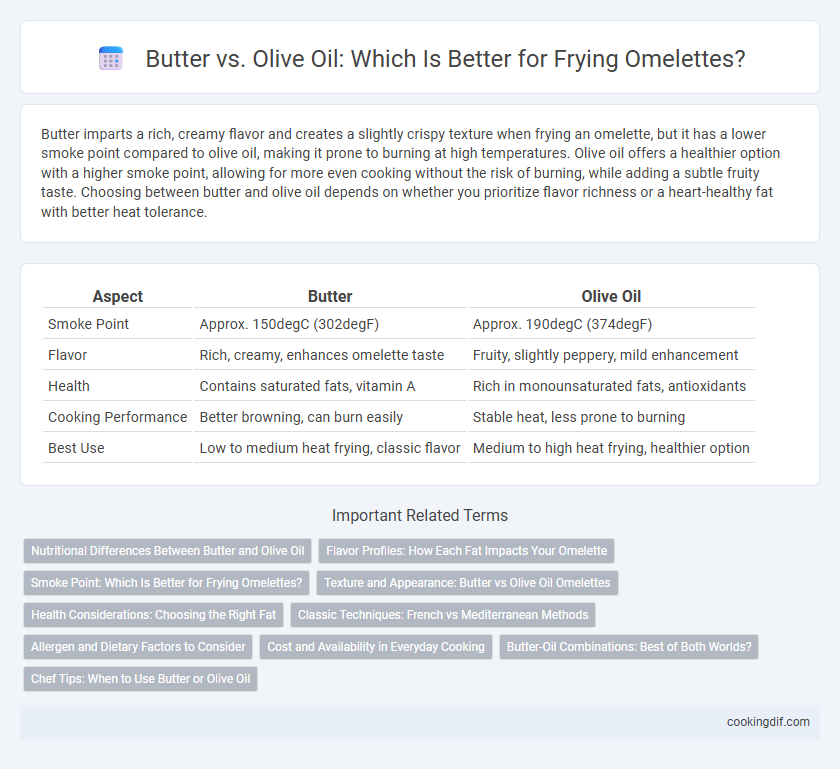Butter imparts a rich, creamy flavor and creates a slightly crispy texture when frying an omelette, but it has a lower smoke point compared to olive oil, making it prone to burning at high temperatures. Olive oil offers a healthier option with a higher smoke point, allowing for more even cooking without the risk of burning, while adding a subtle fruity taste. Choosing between butter and olive oil depends on whether you prioritize flavor richness or a heart-healthy fat with better heat tolerance.
Table of Comparison
| Aspect | Butter | Olive Oil |
|---|---|---|
| Smoke Point | Approx. 150degC (302degF) | Approx. 190degC (374degF) |
| Flavor | Rich, creamy, enhances omelette taste | Fruity, slightly peppery, mild enhancement |
| Health | Contains saturated fats, vitamin A | Rich in monounsaturated fats, antioxidants |
| Cooking Performance | Better browning, can burn easily | Stable heat, less prone to burning |
| Best Use | Low to medium heat frying, classic flavor | Medium to high heat frying, healthier option |
Nutritional Differences Between Butter and Olive Oil
Olive oil contains higher levels of monounsaturated fats, which are linked to heart health benefits, while butter provides saturated fats that may increase LDL cholesterol levels. Butter is rich in fat-soluble vitamins A, D, E, and K2, enhancing nutrient absorption during cooking. Choosing olive oil for frying an omelette helps reduce calorie intake with fewer saturated fats, whereas butter adds distinct flavor and essential fat-soluble vitamins.
Flavor Profiles: How Each Fat Impacts Your Omelette
Butter imparts a rich, creamy flavor to omelettes, creating a slightly nutty and caramelized taste due to its milk solids browning during cooking. Olive oil offers a fruity, herbaceous note that can enhance the freshness of the omelette while providing a lighter mouthfeel. Choosing between butter and olive oil significantly influences the omelette's overall flavor complexity and texture.
Smoke Point: Which Is Better for Frying Omelettes?
Butter has a lower smoke point of around 350degF (175degC), which can lead to browning and burning if overheated, making it suitable for gently frying omelettes at medium heat. Olive oil, especially extra virgin, has a higher smoke point of approximately 375-410degF (190-210degC), allowing for better heat tolerance and less risk of burning during cooking. Choosing olive oil can provide a more stable frying environment for omelettes, while butter offers a richer flavor but requires careful temperature control.
Texture and Appearance: Butter vs Olive Oil Omelettes
Butter produces an omelette with a rich, creamy texture and a golden-brown, slightly crispy exterior due to its milk solids caramelizing during cooking. Olive oil yields a smoother, more uniform surface with a slightly glossy finish, imparting a tender but less crisp texture. The choice between butter and olive oil significantly impacts the omelette's final appearance and mouthfeel, with butter enhancing browning and olive oil promoting even cooking.
Health Considerations: Choosing the Right Fat
Butter offers a rich flavor but contains saturated fats and cholesterol that may impact heart health when consumed in excess. Olive oil, particularly extra virgin, provides monounsaturated fats and antioxidants, supporting cardiovascular health and reducing inflammation. Selecting olive oil for frying omelettes enhances nutritional value while maintaining a balanced lipid profile.
Classic Techniques: French vs Mediterranean Methods
French omelette recipes traditionally use butter for frying due to its ability to provide a rich, creamy flavor and a smooth, tender texture while allowing precise temperature control. Mediterranean methods favor olive oil, which imparts a fruity, robust taste and creates a slightly crisp edge, aligning with the region's emphasis on heart-healthy fats and bold flavors. Both fats influence the omelette's texture and flavor profile, reflecting the cultural preferences inherent in classic French and Mediterranean cooking techniques.
Allergen and Dietary Factors to Consider
Butter contains milk proteins and lactose, making it unsuitable for those with dairy allergies or lactose intolerance, while olive oil is free from common allergens and fits well into vegan and dairy-free diets. Olive oil, rich in monounsaturated fats, supports heart health and offers a neutral allergenic profile, making it ideal for sensitive individuals. Choosing olive oil over butter ensures a safer option for people with dairy allergies or those following plant-based dietary restrictions.
Cost and Availability in Everyday Cooking
Butter offers rich flavor but tends to be more expensive and less shelf-stable compared to olive oil, which is generally more affordable and widely available in most households. Olive oil's longer shelf life and versatility make it a cost-effective choice for everyday cooking, especially in regions where it is a staple pantry item. When considering budget and accessibility, olive oil often provides better value for frequent omelette preparation.
Butter-Oil Combinations: Best of Both Worlds?
Butter and olive oil combined create an ideal cooking medium for omelettes, balancing butter's rich flavor with olive oil's higher smoke point for better heat control. This combination enhances the omelette's texture, producing a tender interior and slightly crisp edges while preventing burning. Using a mix of 1 part butter to 2 parts olive oil optimizes flavor and cooking performance for a perfectly cooked omelette.
Chef Tips: When to Use Butter or Olive Oil
Butter provides a rich, creamy flavor ideal for low to medium-heat frying, enhancing the delicate texture of an omelette without burning quickly. Olive oil, especially extra virgin, offers a healthier fat profile and withstands higher heat, making it perfect for achieving a slightly crispy edge while preserving nutritional benefits. Chefs recommend using butter for traditional, soft omelettes and olive oil when a golden, textured finish is desired.
Butter vs Olive Oil for frying Infographic

 cookingdif.com
cookingdif.com